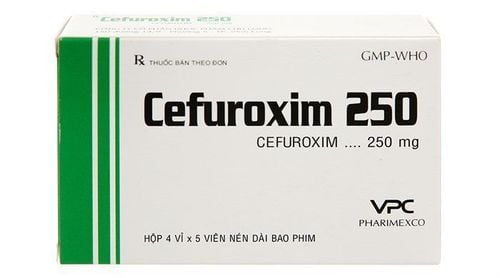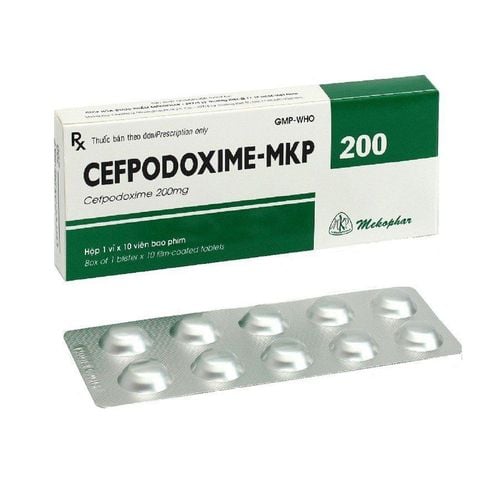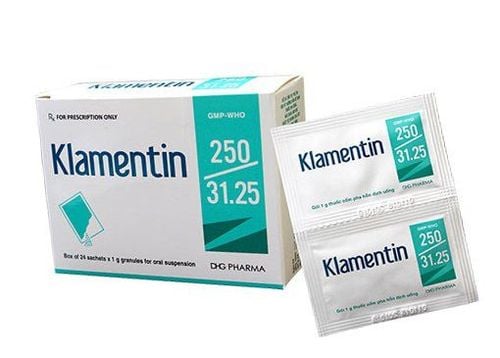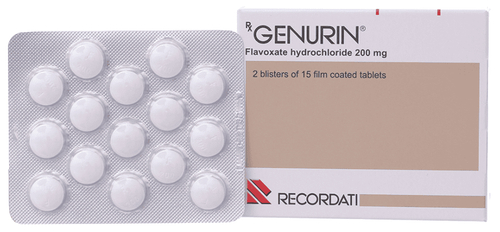This is an automatically translated article.
Dentarfar is a Cephalosporin antibiotic with bactericidal action. The drug is indicated in the treatment of respiratory tract infections, urinary - genital tract infections, skin and soft tissue infections,...1. What is Dentarfar?
Dentarfar with the main ingredient is Cefaclor - a semi-synthetic antibiotic of the Cephalosporin group.
Cefaclor has a broad spectrum of antibacterial activity, through inhibition of bacterial cell wall synthesis and loss of their ability to multiply. The drug is sensitive to aerobic, gram-positive, gram-negative and some anaerobic bacteria.
Dentarfar is well absorbed from the gastrointestinal tract on an empty stomach. Peak plasma concentrations are reached 1 hour after oral administration. It is then completely eliminated in the urine.
2. Indications of the drug Dentarfar
Dentarfar is indicated in the following infections
Mild to moderate infections caused by bacteria. Inflammation of the middle ear. Recurrent tonsillitis. Sore throat . Acute bronchitis, pneumonia superinfection, exacerbation of chronic bronchitis. Nephritis - pyelonephritis , cystitis. Skin and soft tissue infections caused by Streptococcus pyogenes or staphylococcus.
3. Contraindications of the drug Dentarfar
Dentarfar is not indicated for use in patients who are allergic to Cefaclor, cephalosporin antibiotics and any other ingredient of the drug.
4. Notes when using the drug Dentarfar
Long-term drug use can cause pseudomembranous colitis. Patients with renal failure taking Dentarfar should be cautious because the drug is accumulated in the body for a long time. Before taking Dentarfar, a history of allergy to penicillin should be investigated. Patients with peptic ulcer disease, colitis should be cautious when using the drug. The drug crosses the placenta and breast milk, the benefits should be considered when used for pregnant and lactating women. Coombs test (+) during treatment with Dentarfar. When using the drug can cause a false-positive reaction when looking for urine glucose with reducing agents.
5. Interactions of the drug Dentarfar
The combination of Dentarfar and Warfarin can increase prothrombin time, causing bleeding. Drug interactions may be increased in patients with vitamin K deficiency, in patients with renal failure. Probenecid increases the serum concentration of Dentarfar. Aminoglycoside antibiotics or furosemide diuretics may increase nephrotoxicity when co-administered with Dentarfar.
6. Dosage and how to use Dentarfar
How to use Dentarfar:
Dentarfar is prepared in the form of a powder for oral administration. Take the drug before meals to increase the bioavailability of the drug.
Dosage in adults:
Respiratory, genitourinary - urinary tract infections: The usual dose is 250mg x 3 times/day. Maximum dose 4g/day. Use for 7-10 days. Severe infections: 500mg x 3 times/day. Use for 7-10 days. Patients with renal failure glomerular filtration rate 10-50ml/min dose 1⁄2 usual dose. Patients with renal impairment glomerular filtration rate <10ml/min dose 1⁄4 of the usual dose. Dosage in children:
The usual dose is 20-40mg/kg/day, divided into 3 oral doses. Maximum dose 1g/day. Otitis media in children: 40mg/kg/day divided into 2-3 oral doses.
7. Side effects of the drug Dentarfar
Common side effects:
Eosinophilia. Diarrhea, nausea, vomiting. Skin erythema, itching. Uncommon side effects
Neutropenia. Increased lymphocytes. Get angry. Candida infection, vaginal itching, vulva. Joint pain. Rare side effects
Anaphylactic reactions, fever. Stevens-Johnson syndrome. Lyell's syndrome. Systemic purulent rash. Thus, Dentarfar is a broad-spectrum antibiotic, indicated in many infectious diseases caused by susceptible bacteria. Using Dentarfar in the correct dose and time prescribed by your doctor will help you prevent drug resistance.
Please dial HOTLINE for more information or register for an appointment HERE. Download MyVinmec app to make appointments faster and to manage your bookings easily.













